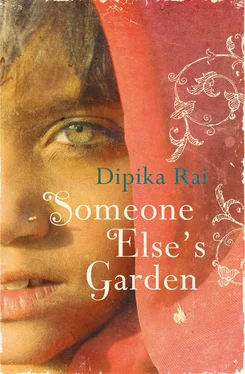1 ...6 7 8 10 11 12 ...23 ‘Finally, the drought ended, and two months later your amma was married to your bapu.
‘You remember, that Seeta Ram of yours turned up with his elder brother. His face was covered with a red cloth that shivered slightly at the mouth every time he breathed. I lifted the groom’s veil just to check if it was really Seeta Ram beneath it. Those days there was a lot of switching of grooms, men who changed their minds often paid someone else to pick up their brides. His brother said your amma was too frail and sunken to be a good wife. But I said no, she is strong as a plough. And to prove it, I made her balance all our earthenware pots filled with water on her head . . . all six of them. Do you remember that?’
‘Yes, I remember how you hit me on the head, and pulled my veil lower over my eyes, and pushed my head down so that my eyes pointed to the floor, all the time smiling at Mamta’s father and his brother. Hai, I was so scared that I thought I would drop the pots on their toes. Ha, ha, ha . . .’ Lata Bai laughs with that special relief that comes with the memory of averted disaster.
‘I remember we ate one sweet semolina ball cut into eight. That was my wedding.’
‘But yours will be different, Mamta, yours will be very different. Now, enough of stories, go make some the tea,’ says the grandmother. ‘What about Mamta’s dowry? What have you given her? Is it more than what we gave you?’ Both mother and grandmother regard the bride-to-be, who smiles at them from the stove out of earshot. ‘Her dowry better be enough. I mean, look at her. That ungodly birthmark has snatched away her beauty. You’d better give her a decent dowry, otherwise she might come back to you charred,’ hisses the grandmother.
‘Mamta’s father has taken a loan from the Big House for her dowry,’ the mother drops her voice too, ‘we had to, otherwise we would never have managed to get a proposal for her. We thought Singh Sahib would be kind to us, because of how much he loved his own wife Bibiji, and because we took the loan for a marriage . . . you could say to . . . to sanctify the act of love . . . but not a chance. Singh Sahib is sick. He can’t be bothered with us. It’s his son Ram Singh or his pet dog Babulal who come for the interest every month. Now Prem goes there to work every day, paying it off. Slavery is what it is.’ Her voice is thick with disappointment. ‘We took a loan and managed to buy nothing. No gold. No cows or goats either, just a bicycle, some pans, and a few clothes . . . I gave her Lucky Sister’s gold earrings, they were the only jewellery I had.’ Days before her own wedding, Lucky Sister had sent her a pair of earrings. They had arrived secretly at night in the hands of one of her customers, the person Lucky Sister most trusted.
‘Now we are like the rest of Mamta’s father’s hookah-sucking friends – all debtors of the Big House. But there is some glamour in it, I suppose. They invite you that one and only time to the Big House veranda and give you tea. They said they would come for the wedding. I think that’s really what made Mamta’s father do it. You know how he is, he loves show.
‘Remember when Ragini got married,’ Lata Bai drops her voice even lower to spare Mamta the anguish of her ensuing words, ‘how excited he was? How much show we put on. He gave Ragini enough dowry for three girls. How rich they were. We nearly passed out when the groom arrived on a horse. Hai, for this wedding we will be paying for the rest of our lives. Better to have been robbed by bandits.’
‘It’s the same anyway, robbed by bandits or the Big House. It’s just the same,’ says the old woman. ‘I don’t envy you. After Mamta and Sneha, you will still have another one to marry off,’ she says, looking at the baby in Lata Bai’s arms. Then she plucks a betel-leaf off her vine, quickly slaps some lime on it and carefully places half in the corner of her mouth. She pops the other half into her husband’s.
‘And now those damned bandits are surrendering.’
* * *
Showing remarkable prescience, Lata Bai has saved last season’s daal for the wedding, trimming her family’s rations by one spoon each day. Daal and chapattis, that’s what she’ll serve, and mustard greens. She will steal some mustard greens from her own field. Why steal? Because, except for a few plants, minutely calculated as sustenance for the family, the crop belongs to Singh Sahib, and the labour of her son too. That was the deal. He gave them money for Mamta’s dowry, they are to give him all their produce in return. All their produce, even the vegetables they grow, go with Prem to the Big House. Why are girls born at all? All they do is get us in debt.
How should she cook the daal? Chillies, of course. The more chillies she uses the less people will eat. She’ll make it go round with enough chillies from her own bush. She opens the earthenware pot and looks inside at the hoarded daal.
It’s almost gone . . . Almost gone? Yes, almost gone. Into the bellies of weevils. They look like seeds themselves. Fat on her grain, they wiggle slowly along the edge of the pot.
Her heart beats in her mouth. The next thing, her ears go deaf to her body’s sounds. She looks around. Her eyes see nothing. She remembers nothing. Not the daal or the weevils that caused all this. Her whole life can be summed up in weevils. The clouds move lazily overhead. The mustard says shrk, shrk. What should she do? She can hear everything clearly. Serve the weevils. That’s what. Grind them into a paste with the daal and serve the weevils. Weevils on her daughter’s wedding.
It is the good time of year, after the visiting dust vanishes into its permanent home somewhere in the mountains. Luckily, this time the storm didn’t take their roof, so the girls don’t have to gather too many reeds from the riverbank, and there’s little work in the fields. Mamta is still with Shanti, masking the holes in her coverlet with dainty embroidered peacocks, and popping pumpkin seeds into her mouth that her mother has slyly hidden for her fittingly behind the picture of the all-giving goddess Lakshmi. Mamta really should be checking the mustard leaf by leaf for aphids. They can destroy the whole crop in a matter of weeks.
‘I’m watching you,’ says Seeta Ram from the door. Her father has returned unexpectedly. ‘What are you doing at home? Get out there to work. And take that . . . that baby with you,’ he smacks her on the back of her head, a safe place for hidden bruising. ‘I’m watching you, just you remember that. I can still send you to the Red Bazaar if that husband of yours doesn’t turn up.’
Seeta Ram had always disliked his eldest daughter with something bordering on revulsion. The revulsion turned to hatred the night Mamta tried to beat him off her mother crying, ‘Don’t touch her, don’t you kill her . . .’ That was when he cut her rations down to a single meal a day of nothing but a dry chapatti.
Mamta looks at her father, blaming him for her whole life. I am glad I’m leaving you, and I won’t have to meet you again . What Mamta sees is a dictatorial, loveless, cruel man. What she doesn’t see is that Seeta Ram is a man without choices, a typical Gopalpur inhabitant, shaped by the destiny of the village. A powerless, brooding man, who has never hankered after things he didn’t deserve. No alternatives ever appeared on his horizon, or in his impermanent world of grass reeds and mud. His world is governed by the force of Gopalpur’s dusty winds and monsoon rains, and the amount of money he owes the Big House, a force he considers on par with an act of God.
She quickly drops Shanti in her tiny hammock and rushes outside.
She swishes through the mustard. Its flowers are high, they leave little pollen dabs all across her clothes like dainty block prints. The mustard says, shrk, shrk, dropping little yellow flowers at her feet. A butterfly snags in her billowing pallav. She removes the creature as gently as she can; still, the wings come off, leaving her holding the wriggling body that looks so much like a worm. For some reason, the death of the butterfly gives her a lump in her throat, and she has to blink hard to keep the tears from running down her face. She looks into the wind, dreaming of her husband-to-be. She judges the intensity of the storm, dallying a little longer, dancing uncharacteristically, her skirt tickling her ankles. Her younger sister Sneha, a little distance away, does her job much more diligently, lifting each leaf carefully. The bride-to-be feels a pang of guilt for work-abandoned moments.
Читать дальше












